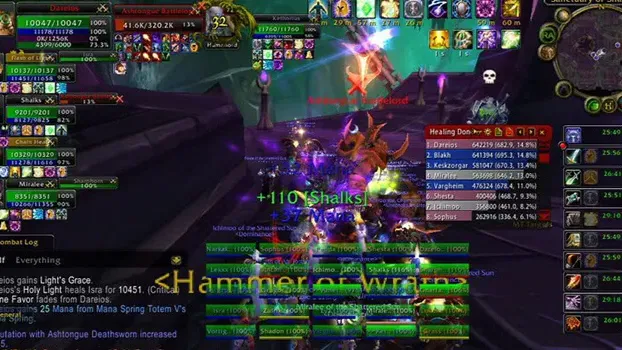Poetry in MOBA
So my housemate plays Defense of the Ancients. He uses Techies, a trio of terrorist, miner goblins that get about hiding explosives everywhere. He plays these things to annoy people and he keeps trying to show me highlights of his endeavours. Normally, I love this kind of stuff. The game-within-a-game you fall into when winning and losing have lost all meaning is, even in games I don’t play, a kind of dadaist performance art I will always respect. But these little show-and-tells never get the reactions he wants because I never have any clue what I’m looking at.
“Is that you?”
“No, that’s Arc Warden”
“What the fuck’s that?”
“He’s a — look, it’s a long story. Just watch”
“Is that you?”
“No, that’s a creep”
“The fuck’s a creep?”
“They attack for you”
“I thought you were attacking?”
“I — no, they — nevermind”
“What’s happening now? Is this another clip?”
“No, it — there’s a lot of different players so it’s changed screens”
At this point, I’m looking at a drone’s eye view of a LARP get hit by a wave of particle effects and I don’t even realize that it was the thing I was meant to be entertained by. This scene will repeat itself two or three times a week. It’s not that something interesting isn’t happening, it’s simply that DOTA has a complex visual language that I don’t speak. Something cool and meaningful is happening and I don’t get it.
“You don’t get it”, says my housemate.
“This is a shit game for awful people”, I reply.
If someone sits you down to watch a movie that is in a foreign language then, at the completion of the film they tell you you didn’t get it, your reaction is, “Well, duh”. The language barrier here is obvious so the people who don’t get it understand why they don’t get it.
I used to, and still largely don’t, get poetry. Prose I can do, but poetry? Bah! Naturally I had to do a significant chunk of work on poetry for Uni. Not enough that it’s something I still pursue, but enough that I could better appreciate a few and see through the mishmash of screen changes, creep waves, lanes, items, and AOE attacks to appreciate tricking an Arc Warden into following you across a line of hidden mines. The poems were all in English, just like DOTA uses a lot of shapes and concepts I understand, but there exists in both a second language (often many more) that, like a cipher, interacts with and augments the superficial to produce something far more complex than the sum of the parts.
I spoke English but I didn’t speak poetry. I speak videogames but I don’t speak DOTA. But tell someone this and they pitch a fit.
Get a brain, moran.
A briefcase full of a million dollars is a terrible thing if you bash me retarded with it, but complain about this and the charitable basher will struggle to understand why their amazing gift has caused any reaction short of heaven-praising. Nothing sums up the combination of technically good with atrocious delivery quite like the phrase, “git gud”, the degeneration of “get good” that has been simmered down to a quasi-literate roux to highlight its stupidity. It’s not-advice advice, exactly what you want but formulated in a way that least provides it. It, like a lot of the internet, is only used ironically and by people who will never know what that means.
For advice to be meaningful, it has to structure action.
“How do I beat this boss?”
“After it does the third flying attack it will sit still, hit it a few times then. You probably want to use something that buffs flame resistance, too”
Then there’s being an unhelpful mong.
“How do I beat this boss?”
“Git gud”
Similarly.
“That movie didn’t make any sense to me”
“Lynch uses a lot of dream imagery and non-narrative film techniques in his works. So the first half of it is actually a dream but he presents it in a way that conflicts with this because you seldom realise you are in a dream when they’re happening.”
And.
“That movie didn’t make any sense”
“You don’t get it”
The caveat to this is that a lot of people will look at a movie like I looked at a poem: something made of parts that I understand but that doesn’t make sense, so it must be broken. Ergo, the conversation usually goes like this:
“That movie was shit”
“You don’t get it”
Someone who doesn’t get it is like someone who can’t beat the boss. Yes, they don’t get it and yes, they need to get good but neither of those responses are remotely productive.
But can you do a gay actuary?
The languages of various creative media have a remarkable amount of internal similarity with the noticeable variation being more akin to slight changes in accent. Some creators develop their thick accents into a kind of regional dialect that outlasts them. But attempting to create a whole new language is typically met with hostility as it, new and without a Rosetta Stone, will often sound like gibberish. The difference between a gibberish and a heretofore unknown language, though, is the latter has a grammar.
Twin Peaks came back last year and with it a great chance to watch the “This is shit” “You didn’t get it” argument play out. Lynch is like Madison Square Garden for fights like this and so makes a great case study, particularly episode 8 which everyone either loves or hates. Now I love it, but that’s because I’m pretty fluent in Lynch.
Firstly, it’s David Lynch. He doesn’t sneak up on you, you know what you’re in for if you sit down to watch one of his things. If I sit an English speaker down to watch a movie like Y Tu Mamá También, the obviously different language overtly signals part of how a viewer may approach it. Lynch does that too. At this point, he probably couldn’t do it any harder. Here he is campaigning for an Oscar for Laura Dern, by the roadside, with a cow.

Secondly, while a comparison to standard narratives would make Lynch’s look like drooling nonsense, that appearance is a matter of poor translation. Lynch has a grammar to his weird shit and it structures a definite language one can learn. Episode 8 was actually, weirdly, among the most direct explanations of what’s going on in Twin Peaks ever, but you needed to be familiar with: Lynch’s sub-language of non-narrative film techniques and what he uses them for; the less popular second season of Twin Peaks; the even less popular prequel film, Fire Walk With Me; and, if possible, the stuff from the companion book. If that sounds like a lot to expect from an audience, I refer you to the above picture.
A giant in a black and white, parallel universe sending a golden ball of perfect teenage girl to Earth to counteract a villain and his army of nightmare lumberjacks let loose by the atomic bomb makes perfect sense when you speak the language it’s spoken in.
You have to listen to a previously unheard language a bit to start picking up on the repetitions that will teach you the grammar, so early experiences will just sound like muddled nonsense. The arts sorta throw a curveball at you, though, because, while some gibberish is a language you don’t understand some of it is actual gibberish.
Native Tongues.
Hey, remember Lisa Turtle from Saved by the Bell? She was the rich one played by Lark Voorhies. She’s written a couple of books in recent years. No, they’re not Saved by the Bell extended universe books, sadly, they’re non-fiction self-help books. Neat. Let’s take a look at an excerpt.

This is the conclusion of the introduction. That’s the part of your writing that summarizes what’s been said and sets up what’s to come. This excerpt actually does that. There are about 15 words in this book not separated by a comma. The whole fucking book is like this and I read it cover to cover. Lark Voorhies is mad as a hat full of assholes.
Here’s the thing, though, that last triplet of triplets, “Till, we, prot. Then, we, trait. We, have, light.” really works as a kind of modernist poetry. I reviewed it as such for an assignment I titled Homicide of the Author. It was to explore the logical conclusion of the death of the author idea, in which people assert their interpretations of a text over the author’s, by turning something that isn’t even intended as art into art. It works fantastically, here’s the description of a later, possibly biographical work, Trek of the Cheshire: A, masterful, journey, into, the, aquadrant, times, of, author, Lark Voorhies. An, elective, abbreviate, that, casts, trace, above, known, entitlements, ‘pon, astloe, monuments, to, date.
Yes, that’s the title.

Firstly, if you are trying to look any of the words that look like words but you’ve never heard of them up, don’t. That labyrinth just leads back to people posting chunks of it and asking what the fuck it means. Secondly, that last line is a fucking classic and has become part of my regular lexicon.
Baby, you’re a real mint of a feeder.
Believe it or not, there’s a real utility to exercises like this. Understanding the deeper grammar of the bizarre is easier when contrasted with actual madness. The structured thought of sane people is comparatively visible. The sane attempt madness by thinking and opposing what their sane thoughts present as cliches in existing art. The y they’re creating is reflecting from a stable x via the equally stable process z.
Lark’s writing isn’t outsider art. She was not attempting prose or poetry and it’s this discordance between intent and reality that reveals the madness. This separates an unlearned grammar like Lynch’s from the agrammatical. But amidst that is still some great stuff. “A real mint of a feeder” is the kind of bizarre only the mad can come up with. But things like that, and other favourable interpretive structures, are impositions from the receiver and not the result of any missed point. Here, one doesn’t get it because there’s legitimately nothing to get.
“I’mma make you my bitch / Cake, cake, cake, cake / Cake, cake, cake, cake / Cake, cake, cake, cake / Cake, cake, cake.”
The problem with the omnipresent belief that anything bizarre is simply meaningless gibberish is that there really is meaningless gibberish. Nobody questions this with something like True Light because real madness makes itself quite apparent. But there are plenty who wilfully omit a grammar and many still who clumsily fumble at half-grasped pieces of other languages, never using them fluently or developing one of their own.
I enjoy train lunatics like a kind of accidental performance art. There’s no grammar to them, just a Lark Voorhies like ability to dip into thought processes that are alien to me and my excitement at possibly seeing something I’d never think to imagine. I’m a fan of Hideo Kojima for the exact same reason.
He’s an auteur by virtue of being one of the 5 videogame developers people can name and by screaming about private military companies on a train regularly enough to become a local character. He is a person who wanted the fight against The End, the sniper from Snake Eater, to last weeks in real time.

He was recently given a big pile of money and freedom on a new game, which he has so far spent hiring movie people he likes. The result, Death Stranding, lurks in our future like hobo penis does to the passengers of the 3:17 Ipswich train.
The thing that differentiates the language of the bizarre from someone just chucking weird shit at a wall is that the former can be translated. As weird as Lynch can present himself, once understood it can be easily explained to someone else because there’s something there to explain. Kojima can’t even explain his game to his own dev team.
The resulting trailers play like an art student madlib because there’s no organising syntax save the madlib’s strange-by numbers structure he jams his ideas into. Article after article go on about his weird as though there may be something under it which is akin to a series of articles on how excited everyone is about what the three inches of so-far exposed hobo shaft could mean for the rest of the show. This is because he doesn’t have a grammar, just a strong accent of style. There’s nothing really behind the weird. Like Lark Voorhies, there are abundant interpretations, even bits that are really good, but he lacks the actual authorial point of a Lynch and this sucks any depth from his nonsense.
The ultimate thing is, like with Lark or a hooting train bum, I largely enjoy Kojima. There needn’t be a deeper language to anything for it to be enjoyable or even good art. But understanding the difference is important if you don’t want to wind up spending years trying to figure out the hidden meaning in True Light. Some bosses are hard by virtue of an unknown pattern the player must discover and exploit. Some are hard because you are under levelled. Knowing the difference makes both playing and advising other players much easier.
“Ah wanted the radge tae jist fuck off ootay ma visage, tae go oan his ain, n jist leave us.”
The point of communication is to understand what has been communicated to or at you. This prioritises the intent of the communicator because I can know what I think about a thing by myself. Supplanting the intended meaning with my own is ignoring a key component of the message and becomes more monologue than dialogue. Homicide of the Author was to highlight a fault inherent in how aggressive death of the author had become, the language is coming from the viewer not from the viewed so, while a fun exercise, it’s more about you than they.
The languages of the bizarre, the surreal, the absurd, the mad, and all else are beautiful things things with actual purposes within creative works. They’re integral tools in allowing presentation media like film, television, and games to open up the kinds of inner emotional worlds, among other things, that forms like prose take for granted. But this value is lost when people can’t differentiate between different kinds much like a DOTA clip is lost on me when I can’t tell a Techies from the rest of the magic whatevers.
The beginning is the toughest part, particularly if it’s your beginning as well. Wading into a cocktail party of full of people speaking a mix of legitimate foreign languages and bullshit then being expected to pick one from the other is tough and that’s basically what you’re doing. Amidst this is the problem of poor communication. Defensive and offensive hostility keep discussion around possible languages a fruitless clusterfuck of poorly rationalised thoughts and defensive IMOs. Why learn if you’re an idiot for not getting it immediately? Why explain when someone refuses to listen?
Some artists have a long canon that began before you were born and this makes finding the language easier as you can be fairly sure one exists to find. Some are new, perhaps making one and perhaps not, so you may be chasing a shadow. Some are such raw madness they aren’t even aware they are artists, and it becomes more an artistic exercise on your part to see what you can mould their extremely silly putty into. Others still lack depth, but this does not mean they lack quality. A singer’s vocalisations may not be deep, or even language, but that doesn’t mean they’re not worth listening to. Being able to differentiate opens you to all arts, be they the complex languages of a decades long career or the quivering, limp penis of a jaundiced train passenger.
By Gabe.





1 replies to The Language of the Bizarre
coffeewaffee on 3rd January 201803 Jan 18 said:
I can see why Lark Voorhies opted to self-publish.
Also a few years ago when I was at university, I used to play dota 2 with a few of my friends. We'd have fun, but occasionally one guy in our group called Sam would just get far too worked up about it and would start screaming to himself and at other members of the group who weren't too good at the game. Hilarious from my perspective.
Anyway, Sam also went to my university, but he was on a different course. However, someone in Sam's flat was friends with someone I knew on my course. So whenever this person was hanging out in Sam's flat, he could hear Sam screaming his head off at people and speaking in the strange and bizarre language that is dotaspeak. Occasionally Sam would also be doing some strange Russian accent and would be swearing in Russian too (there's lots of Russians who play Dota)
It was a very odd experience for the guy on my course to hear all of that and have no idea what any of it meant. So I took it upon myself to explain to him what Sam was screaming about, though that may have just confused him even more.
Comment on The Language of the Bizarre
To reply, please Log in